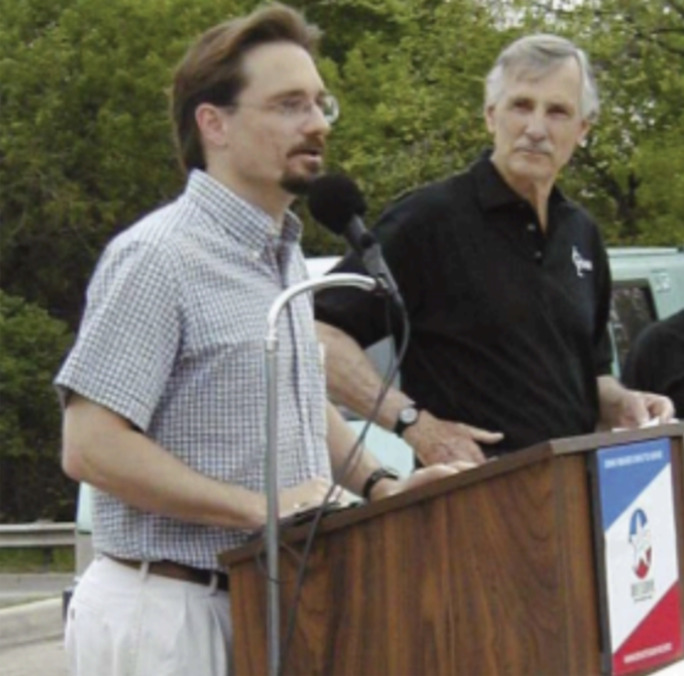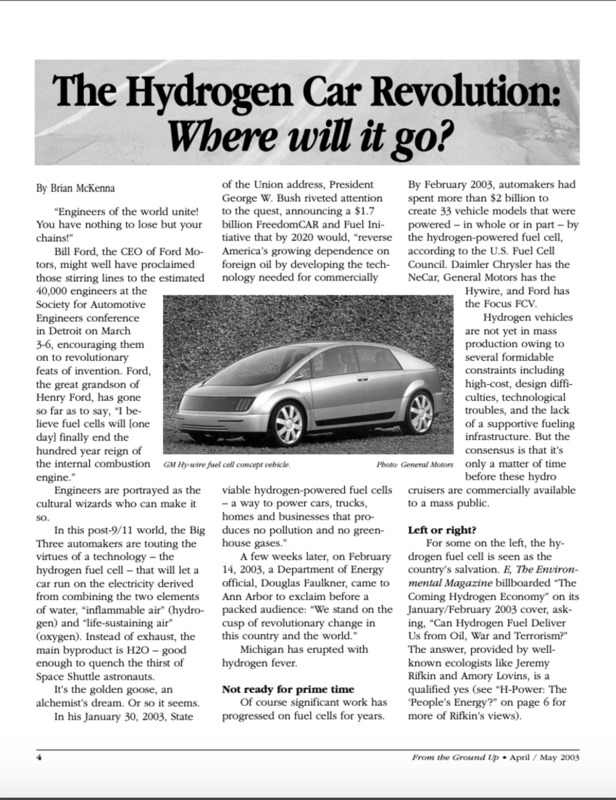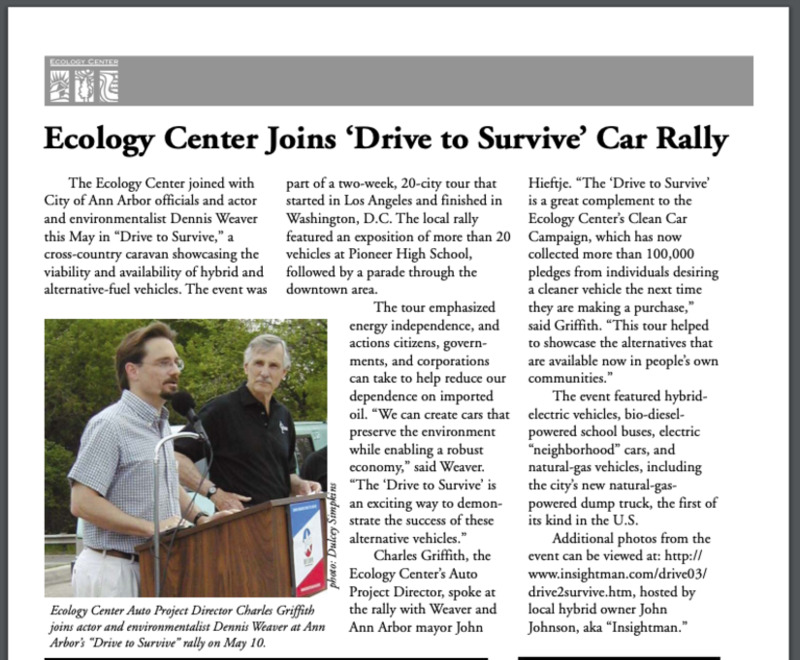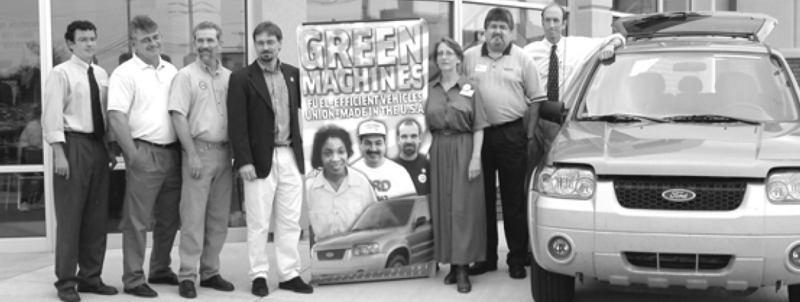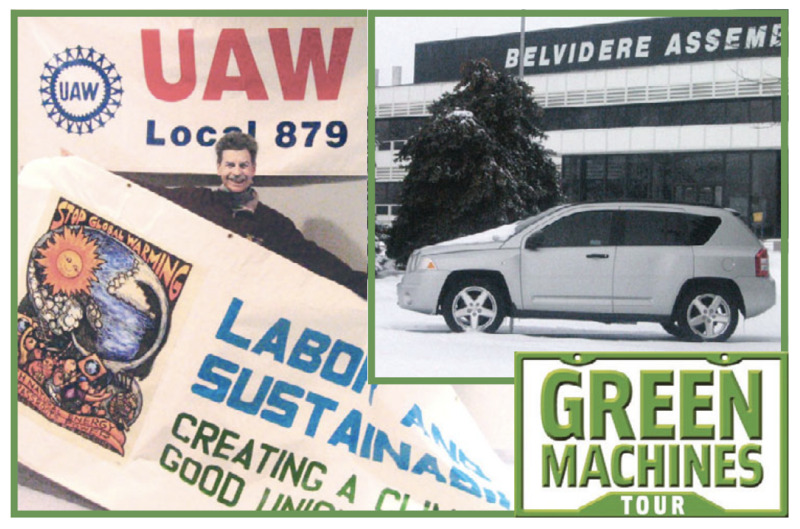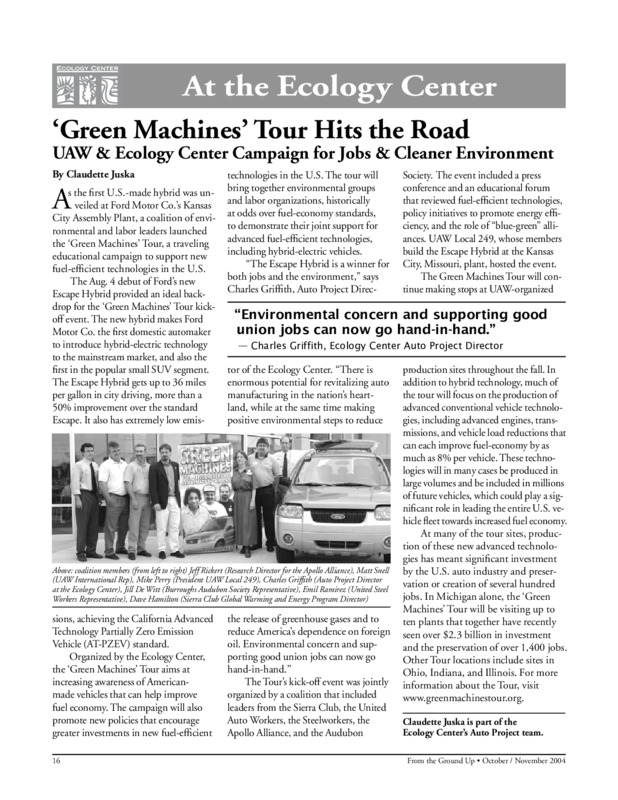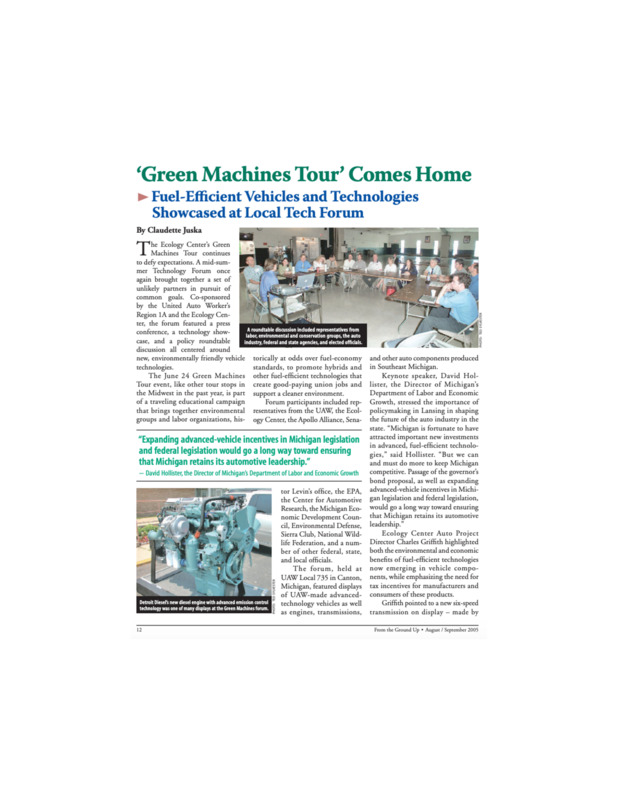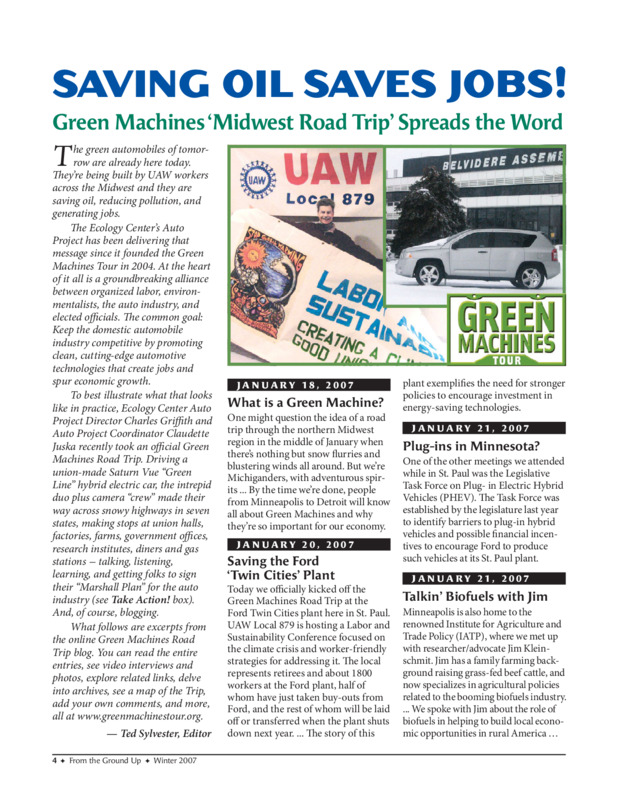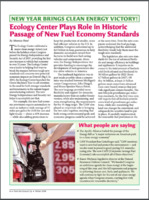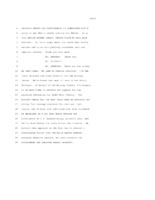See a related article from the Ecology Center's website, Green Machines: Saving Jobs, Saving Lives
Fuel Efficiency and Vehicle Innovation
While the initial effort to increase the fuel efficiency of vehicles in the US started with Congress passing the first Corporate Average Fuel Economy (CAFE) standards in 1975 in response to the oil embargo earlier that decade, the push to create and use less gas and cleaner cars only grew in the following decades. By the 2000s, many environmental groups, including the Ecology Center, began to focus their attention on addressing the larger problems vehicle and gasoline use posed by working toward specific vehicle modifications that could greatly reduce their overall environmental impact. Through their Clean Car Campaign, grassroots activism, policy influence, and research, the Ecology Center helped facilitate substantive change for fuel efficiency and vehicle innovation in the early 2000s.
While the Ecology Center’s Clean Car Campaign focused its attention heavily on removing and replacing toxic mercury switches in cars, it also worked on drumming up excitement about the benefits of hybrid and electric vehicles. These technologies had been developed in the 1990s, but were just starting to enter the mainstream market at the turn of the 21st century. In February of 2000, the Clean Car Campaign started issuing “Clean Car Salutes” to emerging vehicles on the market in order to help people distinguish between cleaner and standard cars. Later, in early 2001, the Clean Car Campaign joined forces with the Green Car Campaign coalition at the North American International Auto Show in Detroit by hosting a car rally and press conference, demonstrating to the ‘big 3’ automakers – General Motors, Ford, and Fiat Chrysler – that consumers are eager for cleaner vehicle options on the market. At the press conference, the Ecology Center and their coalition partners revealed that they had collected over 150,000 signatures calling for automakers to deliver vehicles that met California’s super-ultra low emission vehicle (SULEV) standard for smog-forming pollution, were manufactured using non-toxic, recyclable materials, and delivered 50% better fuel efficiency.
The Ecology Center was also on the front lines of pushing for cleaner vehicles on the local level. After more than a year of effort by the Green Fleets Policy Workgroup – composed of the City of Ann Arbor Energy Office, fleet managers from every Ann Arbor City department, and the Ecology Center – the City of Ann Arbor formally implemented a comprehensive green fleets purchasing policy, which went into effect in January of 2002. The Green Fleets policy required the city to take into account vehicle emissions, fuel economy, and other environmental impacts before purchasing any vehicle for city use. At the time, the city fleet contained over 470 vehicles and emitted 7.8 million lbs of CO2 every year. The Ann Arbor Green Fleets Policy would reduce city vehicle emissions by 780,000 lbs over the course of ten years (10% by 2012) and create aggressive targets to limit other tailpipe pollutants from automobile production and vehicle end-of-life.
Issues with the “Freedom Car” and Hydrogen Fuel Cells
The first years of the Bush Administration brought both a facade of small victories and notable setbacks in terms of moving towards environmentally-friendly vehicles. The federal government filed a lawsuit against California in October of 2002 after the state implemented a rule that 10% of vehicles sold between 2003 and 2008 had to be electric. Endorsing the arguments of the auto industry, the Bush Administration argued that the mandate was unconstitutional and the President’s Chief of Staff even served as a plaintiff in the case. In the following year, President Bush boasted during his State of the Union speech about a public-private research and development partnership his administration had assembled to create a hydrogen fuel cell “Freedom Car.” The Ecology Center issued a press release in response, raising their concerns about the project. They argued that the singular focus on this car, which was not scheduled to hit assembly lines until 2020, acted as a “smokescreen” of sorts, preventing national focus on electric and hybrid car production and substantive increases in fuel economy standards for trucks and SUVs.
Furthermore, the Ecology Center and other environmental organizations found that not only was hydrogen fuel a dangerous material to work with, but that it also was still not all that environmentally advantageous, especially considering the pollution generated from its production and disposal. And while the Bush Administration argued that the importance of the “Freedom Car” project and hydrogen fuel cells pertained to decreasing US dependence on foreign oil, researchers and environmental groups found that higher fuel economy standards – which the Bush Administration had consistently fought – would more effectively achieve that goal. The Ecology Center also found that research backed up their concerns about the overall effectiveness of hydrogen fuel cells. A study conducted by Environmental Defense indicated that fuel cell vehicles faced serious policy and technical barriers due to the absence of market-wise requirements for higher fuel economy standards, rendering them rather unhelpful in reducing vehicles’ overall environmental impact.
Although the “Freedom Car” initiative was more of a facade than actual progress for environmentally-friendly cars, the first term of the Bush Administration was not without any victories. The Ecology Center praised a bipartisan commission in December of 2004 for indicating their support of tax credits for advanced technology vehicles and their production in the US. Additionally, awareness about the availability and benefits of hybrid vehicles was growing, assisted by the Ecology Center’s participation in the national ‘Drive to Survive’ Car Rally. Ann Arbor city officials and award-winning actor and environmentalist Dennis Weaver, the Ecology Center partook in the two-week, 20-city tour across the country that featured hybrid and alternative fuel vehicles. The local Ann Arbor event featured an exposition of 20 cars at Pioneer High School and ended with a parade and rally downtown.
The Green Machines Tour
Shortly after Ford became the first US automaker to release a hybrid vehicle model of their popular Escape, the Ecology Center’s Auto Project, inspired in part by the ‘Drive to Survive’ Car Rally, decided to launch its own educational tour across the Midwest. Initially organized in 2004, the ‘Green Machines’ Tour aimed to increase awareness of American-made vehicles that could help improve fuel economy and bridge the traditional gap between environmental groups and labor organizations across the country in pursuit of cleaner American vehicles. The Green Machines Tour kick off-event was hosted by UAW Local 249 of Kansas City and was jointly organized by an Ecology Center coalition that included leaders from the Sierra Club, the United Auto Workers, the Steelworkers, the Apollo Alliance, and the Audubon Society. The event included a press conference and an educational forum and ignited what was to become a years-long educational initiative across the Midwest.
In 2005 and 2006, the Green Machines Tour stopped at dozens of conferences, events, and forums, using their travelling educational campaign to bring together environmental and labor groups in “green-blue” alliances. In 2005, the Green Machine Tour made a notable stop at a Technology Forum in Canton, Michigan, co-sponsored by the United Auto Workers Region 1A and the Ecology Center. Representatives from Senator Levin’s Office, the Apollo Alliance, EPA, Center for Automotive Research, Michigan Economic Development Council, Environmental Defense, Sierra Club, National Wildlife Federation, and other federal, state, and local officials joined the two sponsoring organizations for a press conference, technology showcase, and policy roundtable to discuss both the environmental and economic benefits of investing in green vehicle technologies.
The Green Machines Tour’s last major event occurred in 2007, when Ecology Center Auto Project Director Charles Griffith and Auto Project Coordinator Claudette Juska completed a month long ‘Midwest Road Trip’ to continue its mission of uniting environmental and organized labor groups in support of cleaner vehicle technologies and policies. Driving a union-built Saturn Vue “Green Line” hybrid electric car, they drove across seven states, stopping at union halls, factories, farms, government offices, research institutes, diners, and gas stations. They kept a blog documenting their experiences on their website (now archived), www.greenmachinestour.com.
Moving the Needle on Renewable Fuels
A few months after the Tour’s road trip, the Michigan Renewable Fuels Commission reported to Governor Granholm their key recommendations and findings. The Ecology Center released a statement in response, urging the Governor to take three key actions by supporting “the development of a low-carbon fuel strategy for renewable fuels; establishment of a next-generation renewable fuels feedstock program; and creation of a program for encouraging retail renewable fuel sales.”
On the national stage, the Senate passed Corporate Average Fuel Economy (CAFE) legislation to make the US vehicle fleet average 35 miles per gallon by the year 2020. The progress the Ecology Center assisted in making for increasing fuel economy culminated with Congress’ passage of the Independence and Security Act of 2007, which provided the first new increase in fuel economy standards in 32 years. The Ecology Center played an important role in the passage of the legislation, as they helped bridge the divide between environmentalists and Michigan’s ‘big 3’ automakers on the issue during their Green Machines Tour project.
Another victory occurred in May of 2009 when the Obama Administration announced that it would set a unified fuel economy standard for the entire country, helping the US to meet its greenhouse gas reduction targets. The Ecology Center celebrated one more achievement in their advocacy efforts for cleaner vehicles before the end of the decade in October of 2009. It was then that Charles Griffith, the Ecology Center’s Clean Car Campaign Director, testified about the implementation of new CAFE standards (which Congress had finally passed two years after they were first introduced in the Senate) to the EPA and the National Highway Traffic Safety Administration.
Article written by Lily Antor, member of the Spring/Summer 2020 Research team.



